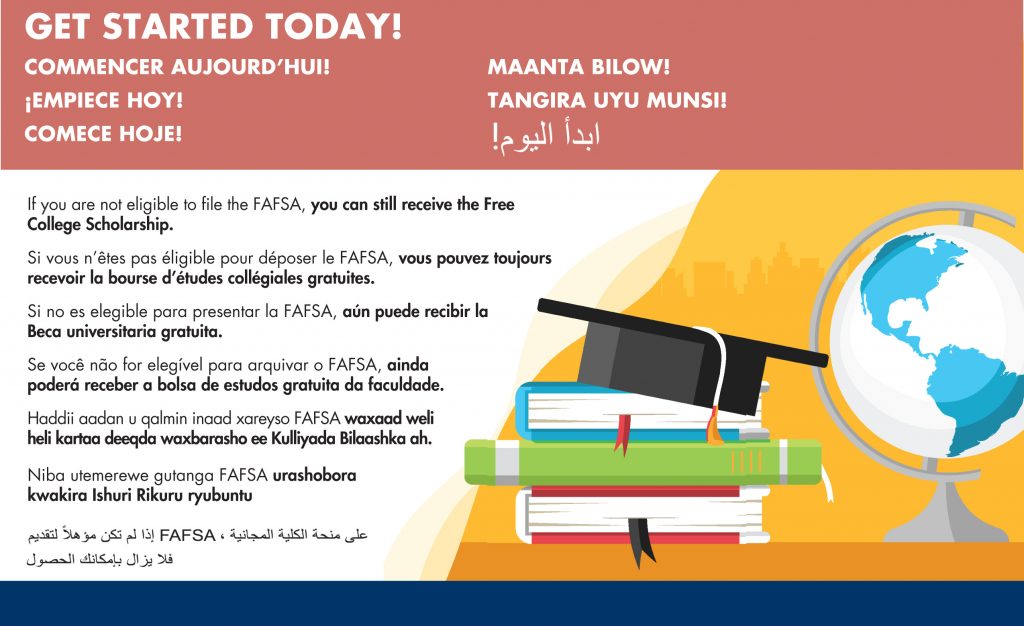Students praise free community college opportunity
Ruscirene Dinanga had been enrolled at Southern Maine Community College for over a year, taking classes part time – while working one full-time job at cPort Federal Credit Union and another on-call as a Portuguese interpreter for Catholic Charities Maine – when she heard about Maine’s new Free Community College Scholarship program. Holding down multiple jobs in addition to college classes was too much. She could barely manage grocery shopping, let alone sit down to eat. So, she decided to apply.
To be eligible, students must live in Maine while enrolled, have a high school diploma or equivalent earned between 2020 to 2023, and enroll full time in an associate’s degree program or a one-year certificate program at one of Maine’s seven community colleges. They also must accept all federal and state grants and tuition waivers offered to them. The Free College initiative is available thanks to a $20 million allocation for free college in Maine’s supplemental budget signed this April by Gov. Janet Mills. The goal is to give students a debt-free community college education as they begin to work toward a career.
Margarida Celestino, another SMCC student who is studying full time with help from the scholarship, had a similarly easy application experience. She said filling out the application took less than five minutes – “maybe even just one minute” – and required only the most basic information. Celestino is an asylum seeker, and therefore is ineligible for federal aid (FASFA), as well as most scholarship programs.
Previously, Celestino had looked into the TRIO Program, which helps low-income Americans pay for college. However, she found that the program does not benefit those without green cards. She tried to manage classes on her own, but found it was impossible, and had just notified her adviser that she would need to drop out of her classes when she received news of the Free College Scholarship program.
The program came at the exact moment Celestino needed it, she said. She had been in college in New York state, but fell ill and had to give up a full scholarship. She was afraid she would never have access to college again.
When Dinango was granted the free enrollment funds, she felt a heavy weight lifted from her shoulders. “You either have the time, or you have the money. I could afford [college] with the work I had been doing, but I did not have the time for anything else. Now, I am able to have some time for both my coursework and myself,” she said. In addition to full-time college, she is still working as an interpreter and a direct support specialist – but these both have flexible hours, which she finds manageable. Making ends meet remains challenging, but nothing like before, she said.“My grandmother always says, ‘Before life gets easy, it gets a little bit harder.’”
Similarly, Celestino, who also works on the side to pay her bills, said that with access to free college, she does not have to work as many hours outside of school as she did before. This gives her more time to dedicate to school while having more of her own time for daily living and socializing with peers. “This scholarship program ensures I can do school well without overburdening myself trying to pay for it,” she said.
She had expected to take one or two classes at a time, while working to pay for each credit. But now she can be enrolled as a full-time student taking four or five classes at once, without paying for each class individually. This removes a huge financial weight.
Dinango said Free College Scholarship students don’t have to take all classes at the standard, full-time rate each semester. The full-time requirement is yearly, but students can overload credits in one semester, in order to take a lighter schedule during the next semester.
Currently, she is enrolled in an architectural program, and plans to graduate with an associate’s degree. Having access to free college now allows her to work toward becoming financially stable. “This is an opportunity for me to do this degree for free! It makes me more eligible to go to a university to [eventually] get my master’s degree and be financially ready for what is coming next.”
Celestino plans to use her associate’s degree in health science as transfer credits into a four-year bachelor’s degree program toward becoming a physician’s assistant. “Without this Free College Scholarship, it would be a lot harder to go right into a four-year program, since I don’t qualify for FAFSA. This means I can start my education for free, save money for the next step, and go to the four-year school later.”
Dinango hopes others will take advantage of this program, which is slated to end with 2023 graduates. Many of her peers, who are coming of age during the pandemic years, have been considering gap years between high school and college, but she hopes they don’t wait to go to college. Celestino agreed. “There will be more job opportunities with a paper [diploma] in hand,” she said. “Students should take advantage of this free access, work hard for two or three years, and get that paper to start a successful future.”
For more information, or to apply for this free opportunity, visit www.mccs.me.edu/freecollege/






